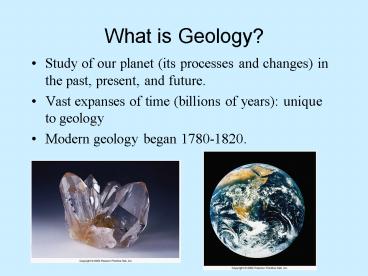What is Geology - PowerPoint PPT Presentation
1 / 18
Title:
What is Geology
Description:
Locate construction materials (building stone, sand and gravel) ... Astrology (horoscopes), Homeopathy, Creation Science, and much alternative ... – PowerPoint PPT presentation
Number of Views:277
Avg rating:3.0/5.0
Title: What is Geology
1
What is Geology?
- Study of our planet (its processes and changes)
in the past, present, and future. - Vast expanses of time (billions of years) unique
to geology - Modern geology began 1780-1820.
2
Why study Geology?
- Locate energy resources (e.g., oil gas, coal).
Alternative energy. - Locate ore and mineral deposits (iron, copper,
aluminum, gypsum) - Locate construction materials (building stone,
sand and gravel) - Locate fresh groundwater (50 of Americans use
groundwater) - Help protect people from natural disasters
tsumani, floods (Katrina), earthquakes,
landslides, volcanoes
3
What is Science?
- Particular way of understanding the natural,
physical world (no supernatural phenomena) - Connects past, present, and future
- Differs from theology and philosophy. How?
Einstein
Descartes
St. Thomas Aquinas
4
Methods of Science
- Requires observations (direct and indirect) and
physical evidence. Must obey rules - Explanations (hypotheses) must be tested
rigorously. Tests (experiments) confirm or
reject hypotheses. A theory is more than a
hunch! - ALL scientific ideas have the potential to be
rejected (new info may arise) non-dogmatic
5
Hypotheses
- Hypotheses can be formulated before or after
observations are made - Accommodation occurs when hypotheses are
constructed after observation (hypothesis fits
the observations) - Prediction occurs when the hypothesis is
formulated before observationsthese observations
then verify validity of hypothesis - Both accommodation and prediction are acceptable
methods of constructing hypotheses
6
So, what is a good scientific hypothesis or
theory?
- Robust explanation passes scrutiny (results
replicated by other scientists) - Reasoning, peer review, and time cull out weak
hypotheses - Be careful of non- and pseudo-science. Astrology
(horoscopes), Homeopathy, Creation Science, and
much alternative medicine is not science.
7
How to Evaluate Hypotheses
- Does it survive falsification (Popper)?
- -falsification is a rhetorical strategy, not a
cornerstone of scientific inquiry - A better measure of reliability for hypotheses
(1) testability (2) review for errors (3)
eliminating alternative hypotheses (method of
multiple-working hypotheses) - Interestingly, successful predictions do not
always guarantee correctness (e.g., Ptolemys
geocentric solar system predicted eclipses and
position of planets)
8
Characteristics of Science
9
1. Conclusions of science are reliable, though
tentative
- Work in progress (new info may require change)
- Example geocentric vs. heliocentric solar
system plate tectonics
10
2. Science is not democratic
- Majority do not win! Scientific revolutions
- Example Alfred Wegeners Continental Drift
hypothesis
11
3. Science is non-dogmatic
- Nothing in the scientific enterprise or
literature requires belief or faith (sometimes,
scientists make assumptions). - Scientists dont believe in an idea scientists
are convinced by the physical evidence. - A belief requires no justification (e.g.,
astrology, alternative medicine, legends, aspects
of religion)
12
4. Science cannot make moral or aesthetic
decisions
- Philosophy, ethics, religion provide guidance
13
5. Science is not Truth
- Science seeks to establish patterns or
relationships (cause and effect) between
observations does not address issues of purpose. - Useful for prediction and postdiction
Durers Melancholy (1514)
beware of obsessions
14
6. Science corrects itself
- People make mistakes science methods are not
wrong, scientists are wrong. - Science is not commentaries, opinion, or
editorialsits a peer-reviewed process
15
7. Science is a human endeavor
- Bias, preconceptions, pet hypotheses may hinder
scientific investigation - Believing is easy, and knowing is hard
16
Why is science education important?
- Economic growth (50 of the U.S. economic growth
since WWII is from science and technology) - National security (military applications covert
activity) - High living standards (medicine, health care,
social services) - Ability to anticipate and react to natural
disasters (e.g. Hurricane Katrina) - Make informed decisions regarding the
environment, political policies, and
international issues
17
Rising Above the Gathering Storm(National
Academy of Sciences, Washington DC)
The US science and technology sector is eroding
and quickly being overtaken by other nations,
especially India and China
18
US Global Ranking
41 nations
TIMSS 2004 results
PISA 2004 results































